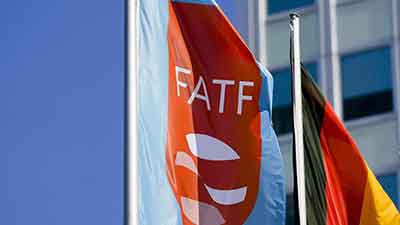Date: 14/02/2023
Relevance: GS-3: Challenges to internal security, money-laundering, and its prevention.
Key Phrases: Financial Action Task Force (FATF) assessment, Indian Penal Code, Criminal Procedure Code and the General Clauses Act, National Investigation Agency, Fourth Round of Mutual Evaluations
Why in News?
- Government agencies have expedited efforts to further strengthen the anti-money laundering and counter-terror financing frameworks because of the coming Financial Action Task Force (FATF) assessment of India in the fourth round of mutual evaluations expected later this year.
Key Highlights:
- The Financial Intelligence Unit is organizing meetings with representatives from sectors like real estate to ensure compliance with KYC (Know Your Client) norms.
- As mandated by law, all the other agencies have been referring cases involving the money laundering angle to the Enforcement Directorate (ED) for further action.
- The ED has attached properties worth over ₹1 lakh crore under the Prevention of Money Laundering Act (PMLA).
- The government has also organized a series of conferences focused on
combating terror financing:
- United Nations Security Council Counter-Terrorism Committee special conference in India;
- The ‘No Money For Terror’ conference where India proposed to host its headquarters
- The UNSC has briefed on challenges to the global counter-terrorism regime at the UN in New York.
The scope of Mutual Evaluations:
- Technical compliance: For assessing whether the necessary legal framework and other associated measures are in force and whether the supporting institutional framework is in place.
- Effectiveness: To determine if the systems are working towards achieving the defined set of outcomes.
Various Laws Passed Against Money Laundering And Terror Financing:
- The Fugitive Economic Offenders Act
- Black Money Act
- The Weapons of Mass Destruction and their Delivery Systems (Prohibition of Unlawful Activities) Amendment Bill, banning the funding of weapons of mass destruction and enabling freezing, seizure or attachment of assets and financial resources of those involved.
Financial Action Task Force (FATF):
- It is an inter-governmental organization, formed in 1989 by the G7 Summit which was held in Paris, established to set standards and promote effective implementation of legal, regulatory, and operational measures for combating money laundering, terrorist financing and other related threats to the integrity of the international financial system.
- It is a “policy-making body” which works to generate the necessary political will to bring about national legislative and regulatory reforms in various areas.
- The FATF Secretariat is housed at the OECD headquarters in Paris.
Challenges In The Indian Legal Framework Highlighted By FATF:
- Exclusion of conduct-based crime:
- Money laundering is a conceptual and conduct-based offense evolved by the legal system of countries.
- In India “offense” had been defined in the Indian Penal Code, Criminal Procedure Code, and the General Clauses Act as an act or omission made punishable by law for the time being in force. It does not explicitly include conduct-based crime.
- Lack of effectiveness of laws:
- On the aspect of “effectiveness”, apart from the instances of attachment/seizure/freezing of assets, the conviction rate in the money laundering/terror financing cases would be crucial to demonstrate effective implementation.
- While the PMLA came into force in 2005, delays in court proceedings concerning the predicated offenses have impacted the outcome.
- Nevertheless, multiple convictions have been secured in the recent past.
- Complex transactions:
- Another challenge is that money laundering investigations involve complex transactions, often involving overseas entities. Therefore, it’s a time-consuming process.
- Treatment of money laundering as a standalone offence:
- Money laundering is not a standalone offence. It is dependent on scheduled/predicated offences under other penal laws.
- However, the government in 2019 notified certain amendments apparently aimed at treating money laundering as a standalone offence.
Recent Government Amendments:
- Provisions related to search-and-seizure and search of persons were modified to do away with the prerequisite of a First Information Report (FIR) or a charge-sheet pertaining to scheduled offences by other agencies.
- An explanation to Section 44 was inserted to clarify that the jurisdiction of the Special Court dealing with a PMLA offence, during investigation, enquiry or trial, would not depend on any orders passed in respect of the scheduled offence, and that the trial of both sets of offences by the same court would not be construed as a joint trial.
- The scope of “proceeds of crime”, under Section 2, was expanded to empower the ED to act against even those assets which “may directly or indirectly be derived or obtained as a result of any criminal activity relatable to the scheduled offence”.
Vijay Madanlal Choudhary Judgment:
- The Supreme Court held that if the accused is discharged or acquitted, or the prosecution stands quashed with respect to the associated predicate offence, there shall be no offence of money laundering.
- Moreover, the judgment does not interpret the phrase ‘criminal activity’, which is not defined in any of the Indian laws, but used in the PMLA. These issues have created a major roadblock that should be addressed.
Conclusion:
- While the ED has taken action in several cases related to terror financing under the PMLA, the National Investigation Agency has also been registering cases to probe criminal conspiracies.
- An emerging challenge is the use of digital assets by criminals, including cryptocurrencies. In several cases, the ED and the Narcotics Control Bureau have seized crypto assets.
- However, this issue also requires attention in terms of legislative initiative and implementation.
Source: The Hindu
Mains Question:
Q. Discuss the various challenges faced by the Indian legal framework against combating money laundering and terrorist financing. (150 words).






















